Related Research Articles

Robert Joseph Flaherty, was an American filmmaker who directed and produced the first commercially successful feature-length documentary film, Nanook of the North (1922). The film made his reputation and nothing in his later life fully equaled its success, although he continued the development of this new genre of narrative documentary with Moana (1926), set in the South Seas, and Man of Aran (1934), filmed in Ireland's Aran Islands. Flaherty is considered the father of both the documentary and the ethnographic film.

John Franklin Candy was a Canadian actor and comedian who is best known for his work in Hollywood films. Candy first rose to national prominence in the 1970s as a member of the Toronto branch of the Second City and its SCTV sketch comedy series. He rose to international fame in the 1980s with his roles in comedy films such as Stripes (1981), Splash (1984), Brewster's Millions (1985), Armed and Dangerous (1986), Spaceballs (1987), Planes, Trains and Automobiles (1987), The Great Outdoors (1988), Uncle Buck (1989), and Cool Runnings (1993). He also appeared in supporting roles in The Blues Brothers (1980), National Lampoon's Vacation (1983), Little Shop of Horrors (1986), Home Alone (1990), and Nothing but Trouble (1991).
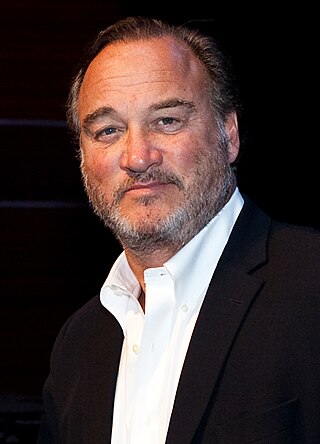
James Adam Belushi is an American actor and comedian. His television roles include Saturday Night Live (1983–1985), According to Jim (2001–2009), and Good Girls Revolt (2015–2016).
Piita Taqtu Irniq, formerly Peter Irniq, is an Inuk politician in Canada, who served as the second commissioner of Nunavut from April 2000 to April 2005.
Kiviuq, also spelled Qiviuq, Kiviok and other variants, is a legendary hero of the epic stories of the Inuit of the Arctic regions of northern Canada, Alaska and Greenland. Versions of his adventures vary with the location and the storyteller. In Greenland he is known as Qooqa. In Alaska he is called Qayaq, which is short for Qayaqtuaġiŋñaqtuaq.
Zacharias Kunuk is a Canadian Inuk producer and director, most notable for his film Atanarjuat: The Fast Runner. It is the first Canadian dramatic feature film produced entirely in Inuktitut with an all Indigenous cast.
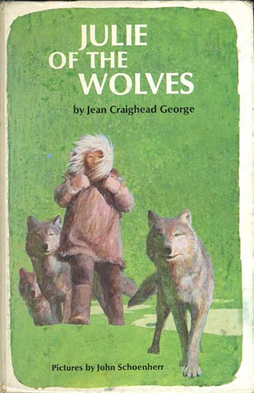
Julie of the Wolves is a children's novel by Jean Craighead George, published by Harper in 1972 with illustrations by John Schoenherr. Set on the Alaska North Slope, it features a young Inuk girl experiencing the changes forced upon her culture from outside. George wrote two sequels that were originally illustrated by Wendell Minor: Julie (1994), which starts 10 minutes after the first book ends, and Julie's Wolf Pack (1997), which is told from the viewpoint of the wolves.

Wired is a 1989 American biographical film of comedian and actor John Belushi, directed by Larry Peerce. It was based on the 1984 book of the same title by Washington Post journalist Bob Woodward, and adapted for the screen by Buckaroo Banzai creator Earl Mac Rauch. It stars Michael Chiklis in his film debut as Belushi. Wired was both a critical and a commercial failure. The film has yet to be released on DVD or Blu-ray, and the videocassette originally released by International Video Entertainment is out of print.

Never Cry Wolf is a 1983 American drama film directed by Carroll Ballard. The film is an adaptation of Farley Mowat's 1963 "subjective non-fiction" book. The film stars Charles Martin Smith as a government biologist sent into the wilderness to study the caribou population, whose decline is believed to be caused by wolves, even though no one has seen a wolf kill a caribou. The film also features Brian Dennehy and Zachary Ittimangnaq.

Jesus Christ Superstar is a 1973 American musical historical drama film directed by Norman Jewison, and co-written by Jewison and Melvyn Bragg, based on the 1970 concept album of the same name written by Tim Rice and composed by Andrew Lloyd Webber, which in turn inspired a 1971 musical. The film, which stars Ted Neeley, Carl Anderson, Yvonne Elliman and Barry Dennen, depicts the conflict between Judas and Jesus and the emotions and motivations of the main characters during the week of the crucifixion of Jesus.
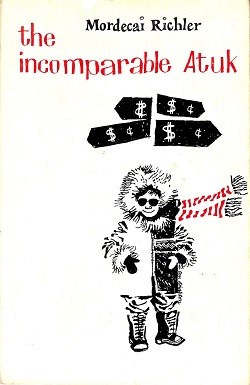
The Incomparable Atuk is a satirical novel by Canadian author Mordecai Richler. It was first published in 1963, by McClelland and Stewart. The novel was published as Stick Your Neck Out in the United States. The Incomparable Atuk tells the story of a Canadian Inuit, who is transplanted to Toronto and quickly adopts the greed and pretensions of the big city.

Inuit are a group of culturally and historically similar Indigenous peoples traditionally inhabiting the Arctic and Subarctic regions of North America, including Greenland, Labrador, Quebec, Nunavut, the Northwest Territories, Yukon (traditionally), Alaska, and Chukotsky District of Chukotka Autonomous Okrug, Russia. Inuit languages are part of the Eskimo–Aleut languages, also known as Inuit-Yupik-Unangan, and also as Eskaleut. Inuit Sign Language is a critically endangered language isolate used in Nunavut.
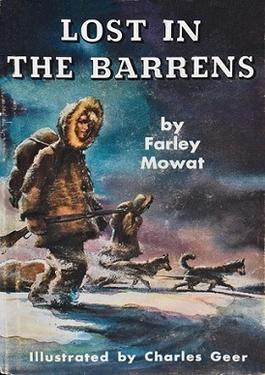
Lost in the Barrens is a 1956 children's novel by Farley Mowat. Later editions used the title Two Against the North.
Project Surname was a project enacted by the Northwest Territories Council and Government of Canada to assign surnames to Inuit. Project Surname was also known as Operation Surname. These assigned surnames eventually replaced the disc number system, where numbers were assigned and kept on discs that people were obligated to wear from the 1940s onward. Family surnames were not used by Inuit until this system was introduced. Traditionally, children received multiple names after birth which reflected their personality, named for a dead relative or sometimes after a living relative. Names would be changed if they were not deemed to suit the child. Project Surname was perceived as less offensive compared to the disk number system but was also criticized as paternalistic intervention from the Canadian government.

Alethea Arnaquq-Baril is an Inuk filmmaker, known for her work on Inuit life and culture. She is the owner of Unikkaat Studios, a production company in Iqaluit, which produces Inuktitut films. She was awarded the Canadian Meritorious Service Cross, in 2017 in recognition of her work as an activist and filmmaker. She currently works part-time at the Qanak Collective, a social project which supports Inuit empowerment initiatives.

The Grizzlies is a 2018 Canadian sports drama film, directed by Miranda de Pencier. Based on a true story, the film depicts a youth lacrosse team that was set up to help combat an onslaught of youth suicide in the community of Kugluktuk, Nunavut.

Simonie Michael was a Canadian politician from the eastern Northwest Territories who was the first Inuk elected to a legislature in Canada. Before becoming involved in politics, Michael worked as a carpenter and business owner, and was one of very few translators between Inuktitut and English. He became a prominent member of the Inuit co-operative housing movement and a community activist in Iqaluit, and was appointed to a series of governing bodies, including the precursor to the Iqaluit City Council.
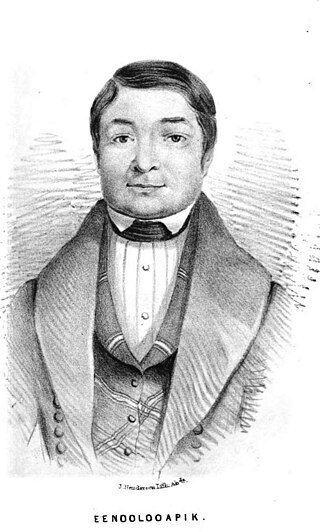
Eenoolooapik, also spelled Inuluapik, was an Inuit hunter and guide who served with British whaler William Penny and visited Scotland. Born on Blacklead Island in Cumberland Sound, Eenoolooapik moved with his family to the island of Aggijjat on the eastern coast of Baffin Island. Acquainted as a youth with Scottish whalers operating in the area, he accompanied Penny to Aberdeen, Scotland in 1839, as part of Penny's attempt to lobby for greater funding for Arctic exploration. Eenoolooapik returned to Baffin in 1840 after visiting Greenland. Alexander McDonald published a biography of Eenoolooapik in 1841, likely the only contemporary full-length biography of any Inuit published during the 19th century. In 1847, he died of tuberculosis developed during his time overseas.

Kakiniit are the traditional tattoos of the Inuit of the North American Arctic. The practice is done almost exclusively among women, with women exclusively tattooing other women with the tattoos for various purposes. Men could also receive tattoos but these were often much less extensive than the tattoos a woman would receive. Facial tattoos are individually referred to as tunniit (ᑐᓃᑦ), and would mark an individual's transition to womanhood. The individual tattoos bear unique meaning to Inuit women, with each individual tattoo carrying symbolic meaning. However, in Inuinnaqtun, kakiniq refers to facial tattoos.
References
- ↑ "It Wasn't His Last Picture Show". The Spokesman-Review . The New York Times News Service. 1972-03-09. p. 8B.
- ↑ "Jewison Will Film Incomparable Atuk". Ottawa Citizen . The Canadian Press. 1971-11-13. p. 38.
- ↑ Evans, Bradford (3 March 2011). "The Lost Roles of John Belushi". Splisider. Archived from the original on 17 May 2018. Retrieved 12 August 2015.
- ↑ Klady, Leonard (1988-01-24). "Cinefile". Los Angeles Times . Retrieved 2014-08-02.
- ↑ Goldstein, Patrick (1988-11-20). "What Makes Sammy Scream?: A Hellish Night Out With Sam Kinison, the Most Dangerous Man in Show Business". Los Angeles Times . Retrieved 2014-08-02.
- ↑ "Studio Sues Comedian for Failing to Do Movie". The Spokesman-Review . Associated Press. 1988-02-27. p. C2.
- ↑ "Into One Cast, Out of Another". Star-News . 1988-07-14. p. 2D.
- ↑ Raouf, Neda (1999-02-21). "The 'Atuk' Curse". Los Angeles Times . Retrieved 2014-08-02.
- ↑ Taylor, Brett. "Hollywood Curse Legends". csicop.org. CSI. Retrieved 10 July 2018.